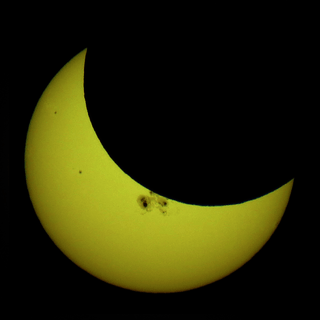Solar eclipse of June 30, 1954
| Solar eclipse of June 30, 1954 | |
|---|---|
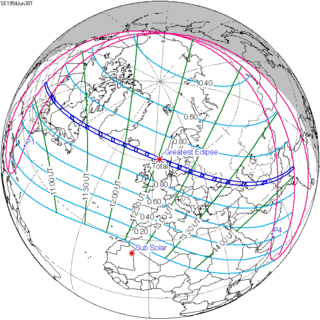 Map | |
| Type of eclipse | |
| Nature | Total |
| Gamma | 0.6135 |
| Magnitude | 1.0357 |
| Maximum eclipse | |
| Duration | 155 sec (2 m 35 s) |
| Coordinates | 60°30′N 4°12′E / 60.5°N 4.2°E |
| Max. width of band | 153 km (95 mi) |
| Times (UTC) | |
| Greatest eclipse | 12:32:38 |
| References | |
| Saros | 126 (44 of 72) |
| Catalog # (SE5000) | 9408 |
A total solar eclipse occurred on June 30, 1954. A solar eclipse occurs when the Moon passes between Earth and the Sun, thereby totally or partly obscuring the image of the Sun for a viewer on Earth. A total solar eclipse occurs when the Moon's apparent diameter is larger than the Sun's, blocking all direct sunlight, turning day into darkness. Totality occurs in a narrow path across Earth's surface, with the partial solar eclipse visible over a surrounding region thousands of kilometres wide.
Visibility
Totality began at sunrise over the United States over Nebraska, South Dakota, Minnesota, and Wisconsin, and crossed into Canada, across southern Greenland, Iceland and Faroe Islands, then into Europe, across Norway, Sweden, and eastern Europe. It ended before sunset over Iran, Afghanistan, Pakistan, and ending in northwestern India. The southwestern part of Vilnius, northeastern part of Kiev, southwestern part of Baku were covered by the path of totality.
The northeastern part of Mount Elbrus, the highest mountain in Europe, also lies in the path of totality.
Related eclipses
Solar eclipses of 1953-1956
This eclipse is a member of a semester series. An eclipse in a semester series of solar eclipses repeats approximately every 177 days and 4 hours (a semester) at alternating nodes of the Moon's orbit.[1]
Note: Partial solar eclipse of February 14, 1953 and August 9, 1953 belong to the last lunar year set.
| Solar eclipse series sets from 1953–1956 | ||||
|---|---|---|---|---|
| Descending node | Ascending node | |||
| Saros | Map | Saros | Map | |
| 116 |  July 11, 1953 Partial |
121 | 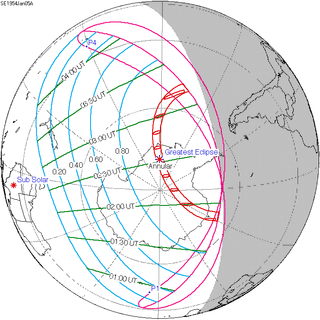 January 5, 1954 Annular | |
| 126 |  June 30, 1954 Total |
131 | 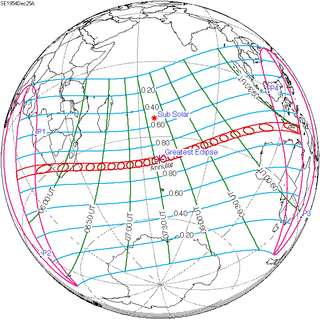 December 25, 1954 Annular | |
| 136 | 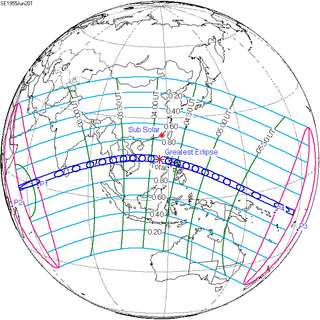 June 20, 1955 Total |
141 | 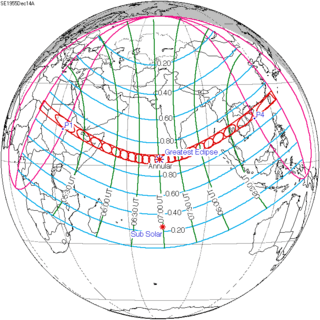 December 14, 1955 Annular | |
| 146 | 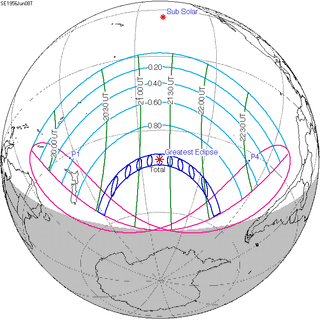 June 8, 1956 Total |
151 |  December 2, 1956 Partial | |
Saros 126
It is a part of Saros cycle 126, repeating every 18 years, 11 days, containing 71 events. The series started with partial solar eclipse on March 10, 1179. It contains annular eclipses from June 4, 1323 through April 4, 1810 and hybrid eclipses from April 14, 1828 through May 6, 1864. It contains total eclipses from May 17, 1882 through August 23, 2044. The series ends at member 72 as a partial eclipse on May 3, 2459. The longest duration of central eclipse (annular or total) was 5 minutes, 46 seconds of annularity on November 22, 1593. The longest duration of totality was 2 minutes, 36 seconds on July 10, 1972.[2]
| Series members 39–49 occur between 1901 and 2100 | ||
|---|---|---|
| 39 | 40 | 41 |
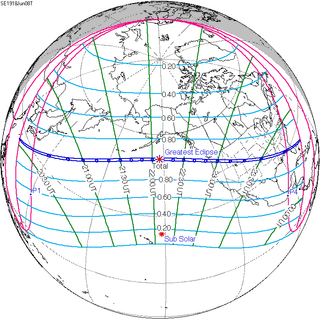 June 8, 1918 |
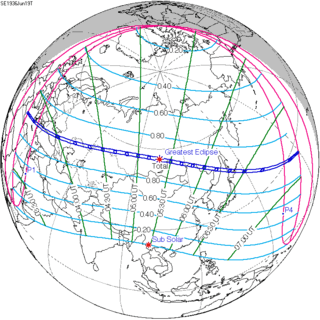 June 19, 1936 |
 June 30, 1954 |
| 42 | 43 | 44 |
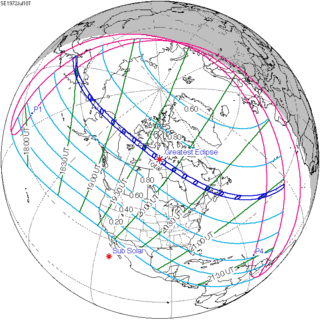 July 10, 1972 |
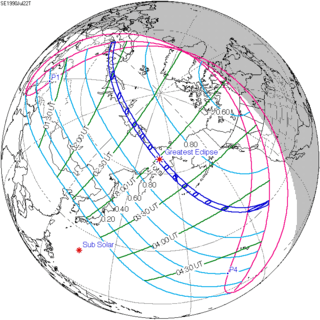 July 22, 1990 |
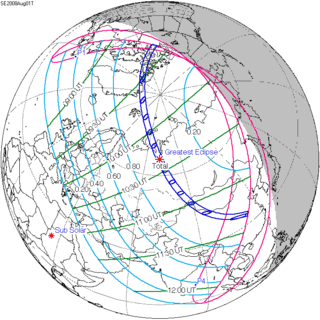 August 1, 2008 |
| 45 | 46 | 47 |
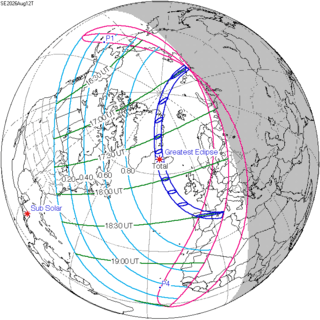 August 12, 2026 |
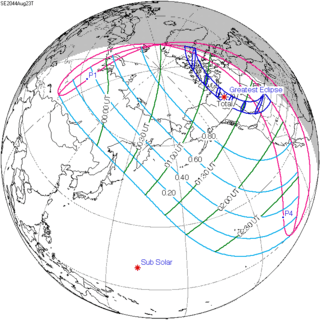 August 23, 2044 |
 September 3, 2062 |
| 48 | 49 | |
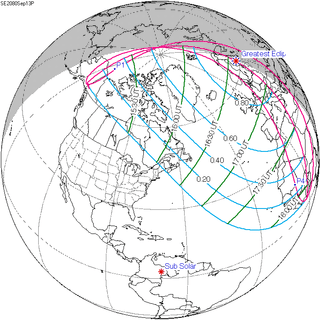 September 13, 2080 |
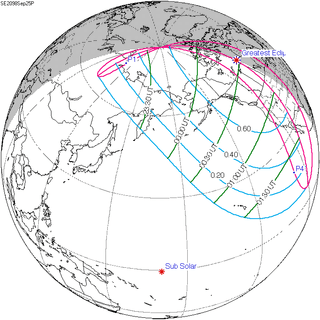 September 25, 2098 | |
Metonic series
The metonic series repeats eclipses every 19 years (6939.69 days), lasting about 5 cycles. Eclipses occur in nearly the same calendar date. In addition, the octon subseries repeats 1/5 of that or every 3.8 years (1387.94 days).
| 22 eclipse events between September 12, 1931 and July 1, 2011. | ||||
|---|---|---|---|---|
| September 11-12 | June 30-July 1 | April 18-19 | February 4-5 | November 22-23 |
| 114 | 116 | 118 | 120 | 122 |
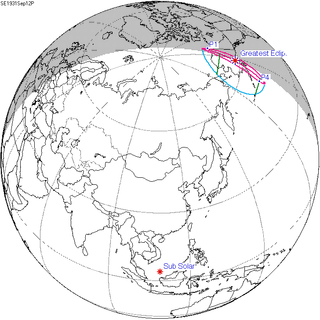 September 12, 1931 |
 June 30, 1935 |
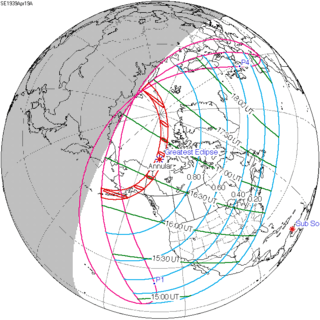 April 19, 1939 |
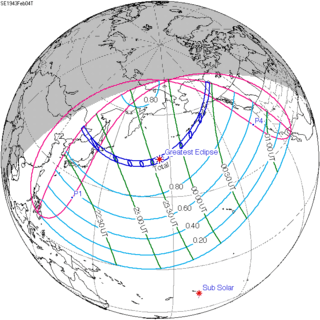 February 4, 1943 |
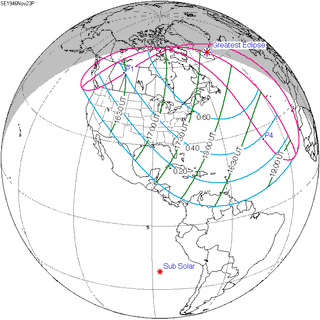 November 23, 1946 |
| 124 | 126 | 128 | 130 | 132 |
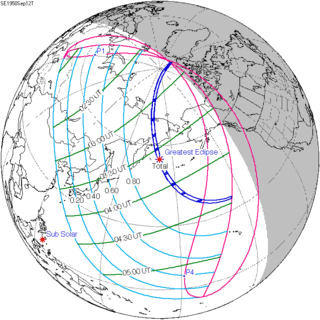 September 12, 1950 |
 June 30, 1954 |
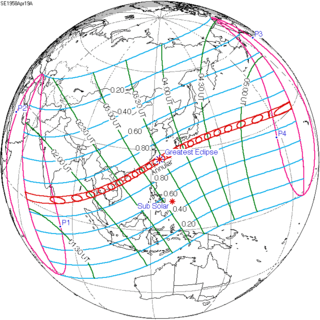 April 19, 1958 |
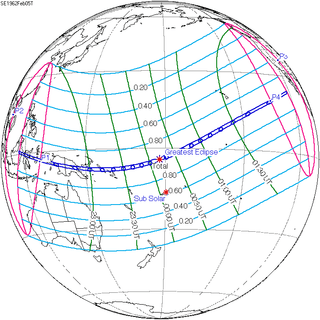 February 5, 1962 |
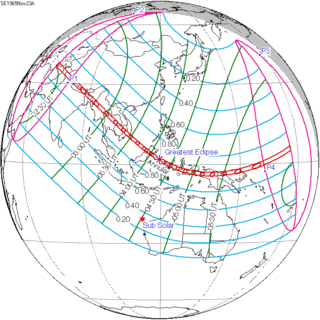 November 23, 1965 |
| 134 | 136 | 138 | 140 | 142 |
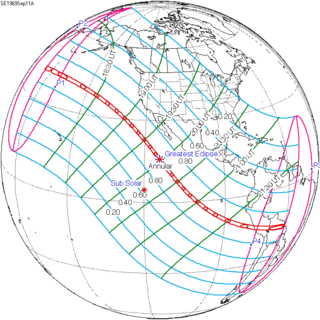 September 11, 1969 |
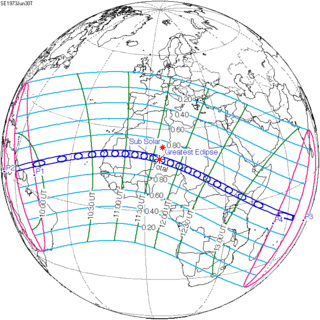 June 30, 1973 |
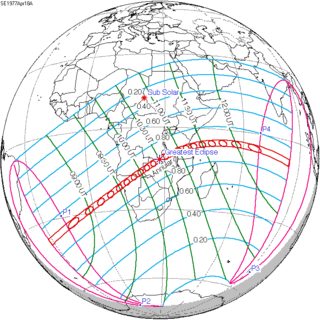 April 18, 1977 |
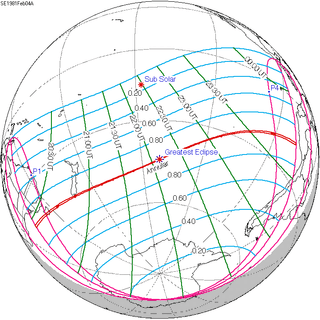 February 4, 1981 |
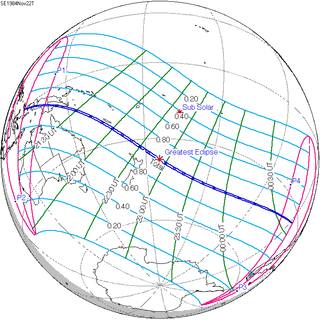 November 22, 1984 |
| 144 | 146 | 148 | 150 | 152 |
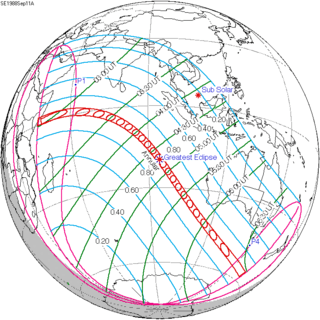 September 11, 1988 |
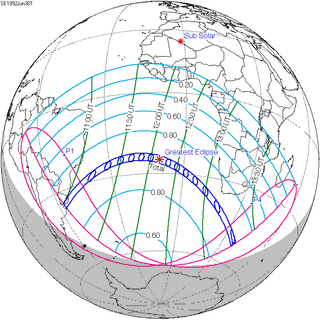 June 30, 1992 |
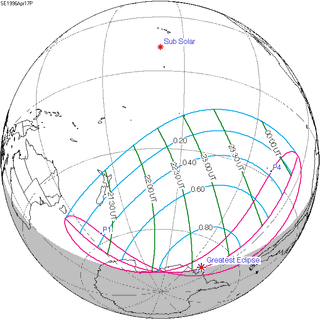 April 17, 1996 |
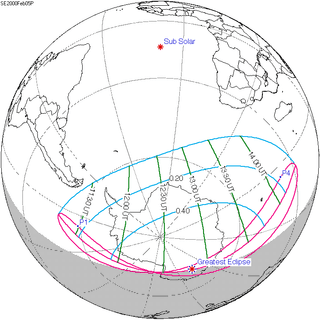 February 5, 2000 |
 November 23, 2003 |
| 154 | 156 | |||
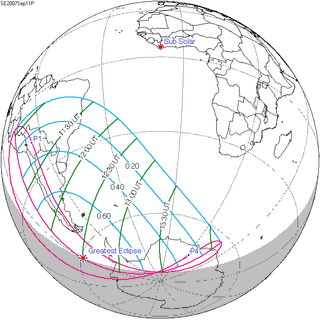 September 11, 2007 |
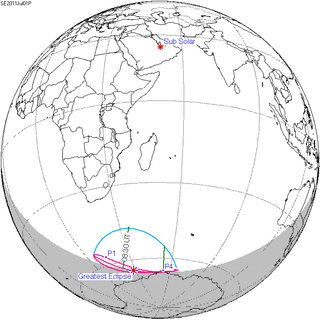 July 1, 2011 | |||
See also
Notes
- ↑ van Gent, R.H. "Solar- and Lunar-Eclipse Predictions from Antiquity to the Present". A Catalogue of Eclipse Cycles. Utrecht University. Retrieved 6 October 2018.
- ↑ Solar_Saros_series_126, accessed October 2010
References
- Earth visibility chart and eclipse statistics Eclipse Predictions by Fred Espenak, NASA/GSFC
- Photo from Russia
- Solar eclipse of June 30, 1954 in Russia
- Photo of Solar eclipse
- BBC: 1954: Three continents see eclipse of sun (Article and video)
- http://retrofutureground.tumblr.com/post/99724896027/bill-seaman-story-of-eclipse-in-one-picture
| Wikimedia Commons has media related to Solar eclipse of 1954 June 30. |

